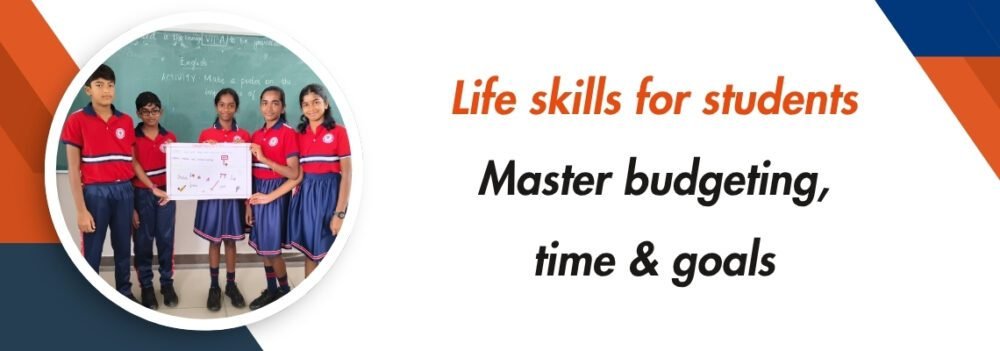Life skills like budgeting, time management and goal-setting are as crucial as academic subjects for student success. These practical skills help you apply classroom learning in the real world. For example, managing money or planning your schedule teaches responsibility. Experts note that in our complex world, mastering life skills lays “the foundation for building a fulfilling career, nurturing meaningful relationships, and leading a balanced life”. In other words, being good with money, time, and goals doesn’t just help you get good grades – it builds confidence and prepares you for adulthood.
Take it from educators: students who develop these skills become well-rounded and ready for future challenges. As one school guide puts it, mastering life skills helps teens “become proactive, adaptive, and resilient” – qualities that set you up for success both in school and beyond. In short, practicing budgeting, effective time use, and goal-setting now can make high school less stressful and life after graduation much easier.
Budgeting: Managing Money Wisely
Budgeting means planning how to spend and save money effectively. Learning to budget gives students control over their finances and helps turn goals into reality. In fact, financial experts say “budgeting, saving, and investing are all skills that financial literacy teaches students, preparing them for financial independence”. This means that even simple money habits now – like tracking pocket money or allowance – can pay off later.
In India, teens often receive money from parents or gifts for festivals. Without guidance, that money can be spent quickly. Teaching young people that money is earned and limited helps them respect it. As one Indian financial blog explains, involving kids in family budgets and showing them bills lets them see the effort behind each rupee earned. This early lesson encourages saving: for example, setting aside pocket money for a new phone or course teaches delayed gratification and planning.
To build solid budgeting habits, students can start with simple steps:
- Set up a basic budget: Allocate portions of your money to spending, saving, and even charity. A 50-30-20 rule (for instance, 50% spend, 30% save, 20% for goals) can be adapted for pocket money.
- Track spending: Write down purchases or use a budgeting app (like Mint or a simple notebook). Being aware of where your money goes helps you cut out unnecessary expenses.
- Save for specific goals: Give yourself clear targets (e.g. saving for concert tickets or a gadget). When teens save for a goal, it builds discipline and a sense of ownership.
- Use tools: Mobile apps (Mint, You Need a Budget, or even simple digital wallets) can make tracking easy. Start a small savings account or piggy bank and add to it regularly. Over time, these habits become natural.
By learning to budget now, students avoid money traps later. They gain confidence knowing they can handle cash wisely – an important life skill that eases future decisions like choosing courses or managing expenses in college.
Time Management: Balancing School and Life

Good time management is often called the “cornerstone of success” for students. With classes, homework, and hobbies competing for attention, planning your time can make a huge difference. When you organize a daily schedule and stick to it, you reduce last-minute stress and stay on top of deadlines. One study notes that proper time management “enables you to focus on what matters, making it easier to reach your objectives”. In short, managing your time well helps you finish your work faster and free up time for fun.
Here are some proven time-management strategies:
- Create a daily plan: List out all your tasks (studies, sports, chores, free time) and assign time blocks. Use a planner or phone calendar. This way, each day has a clear structure.
- Prioritize tasks: Decide what’s most important (such as studying for an exam or completing an assignment) and do that first. Tackle urgent or tough tasks when your energy is highest.
- Break big projects into steps: If an assignment is overwhelming, split it. For example, writing a 5,000-word essay could mean “write 500 words daily”. Setting such small goals keeps you motivated and makes progress steady.
- Avoid procrastination: Use techniques like the Pomodoro (25 minutes of work, 5-minute break), and eliminate distractions (turn off phone notifications or social media during study time).
- Use tools and routines: Online calendars, reminder apps, or simple to-do lists can be very helpful. Try planning the night before or at the start of the week to know what’s ahead.
- Take breaks and rest: Remember to schedule short breaks between study sessions – a quick walk or snack can recharge you. Also ensure you get enough sleep each night.
By practicing these habits, students report less stress and better grades. They find more free time for hobbies and friends too. As one education guide emphasizes, efficient time use “allows you to dedicate time to hobbies and relaxation” and paves the way for balanced, successful learning.
Goal Setting: Aiming High and Staying Motivated
Setting clear goals gives purpose to your hard work. For high school students, defining what you want to achieve (like a certain grade or learning a new skill) provides direction. Without goals, it’s easy to feel lost or unmotivated. In fact, one school guide explains that goals help students understand “exactly what they want to do and how they can do it”. When you know your target, every study session and project has meaning.
Goal-setting also builds self-motivation. Achieving even small goals boosts confidence and encourages you to set new ones. Research shows that students who set goals are more focused and put in extra effort, leading to better outcomes. For example, improving a grade in math becomes more manageable when you break it into steps – like practicing problems every day or getting weekly tutoring.
Use these tips to set effective goals:
- Be SMART: Make goals Specific, Measurable, Achievable, Relevant, and Time-bound. Instead of “I want to do better in school,” say “I want to raise my math grade by one letter by the end of the semester”.
- Write them down: Putting goals in writing makes them more concrete. Keep your goals visible (on a sticky note or in a journal) to remind yourself of what you’re working toward.
- Break goals into steps: Divide a big goal into smaller tasks or milestones. For example, to improve in science, set weekly targets for studying chapters or doing extra exercises. Tracking these mini-goals shows progress.
- Visualize success: Imagine reaching your goal – how it feels and what it looks like. This can keep you motivated on tough days.
- Reward milestones: Celebrate when you hit a milestone (like a chapter completed or a practice test aced). Even small rewards (a treat, a fun outing, or just a break) reinforce positive effort.
- Stay accountable: Share your goals with a friend, parent, or teacher. They can encourage you and help you stay on track.
By consistently setting and reviewing goals, students learn responsibility and perseverance. Over time, this builds self-discipline. As Orchids International School notes, achieving goals instills a sense of accomplishment that “enhances self-esteem” and motivates further success.
Developing life skills in high school – budgeting your money, managing your time, and setting clear goals – pays huge dividends. These skills work together: a student who budgets well can fund their goals; one who manages time well can make time to pursue those goals. By practicing these skills now, you build a strong foundation for the future. As experts point out, students who master such life skills “become well-rounded individuals capable of handling the complexities of life”.
In short, investing effort in these practical skills leads to greater confidence, less stress, and more success. Whether you’re saving for a goal, planning your study schedule, or aiming for a big achievement, remember that these habits will serve you well beyond the classroom. Start small, stay consistent, and watch how budgeting, time management, and goal-setting transform your school years and set you up for a balanced, successful future.


